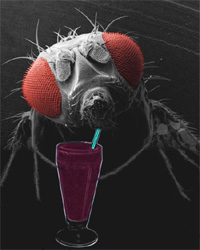
Photo: Partridge et al.In April, the United States Centers for Disease Control and Prevention released a study challenging the conventional wisdom that eating less promotes longevity. Now, in a new study in the premier open access journal PLoS Biology, William Mair, Matthew Piper, and Linda Partridge show that flies can actually live longer without reducing calories by eating proportionally less yeast, supporting the notion that calorie-restriction-induced longevity may not be as universal as once thought.
Dietary restriction in Drosophila involves diluting the nutrients in the fly's standard lab diet of yeast and sugar to a level known to maximize life span. Since both yeast (which contributes protein and fat) and sugar (carbohydrates) provide the same calories per gram, the authors could adjust nutrient composition without affecting the calorie count, allowing them to separate the effects of calories and nutrients. Reducing both nutrients increased the flies' life spans, but yeast had a much greater effect: reducing yeast from control to dietary restriction levels increased median life span by over 60%. Forty-eight hours after being switched from normal diets to yeast-restricted diets, flies were no more likely to die than flies fed the yeast-restricted diet from the beginning. In contrast, those switched from the standard restriction diet to the sugar-restricted diet began to die at the same rate as flies on the control diet.
These results make a strong case that calories per se are not the salient factor in prolonging life--at least in fruitflies. The dramatic impact of reducing yeast suggests that protein or fat plays a greater role in fly longevity than sugar. This in turn suggests, the authors argue, that yeast and sugar trigger different metabolic pathways with different effects on life span.
###
Mair W, Piper MDW, Partridge L (2005) Calories do not explain extension of life span by dietary restriction in Drosophila. PLoS Biol 3(7): e223.
Source : PLoS Biology
 Print Article
Print Article Mail to a Friend
Mail to a Friend
